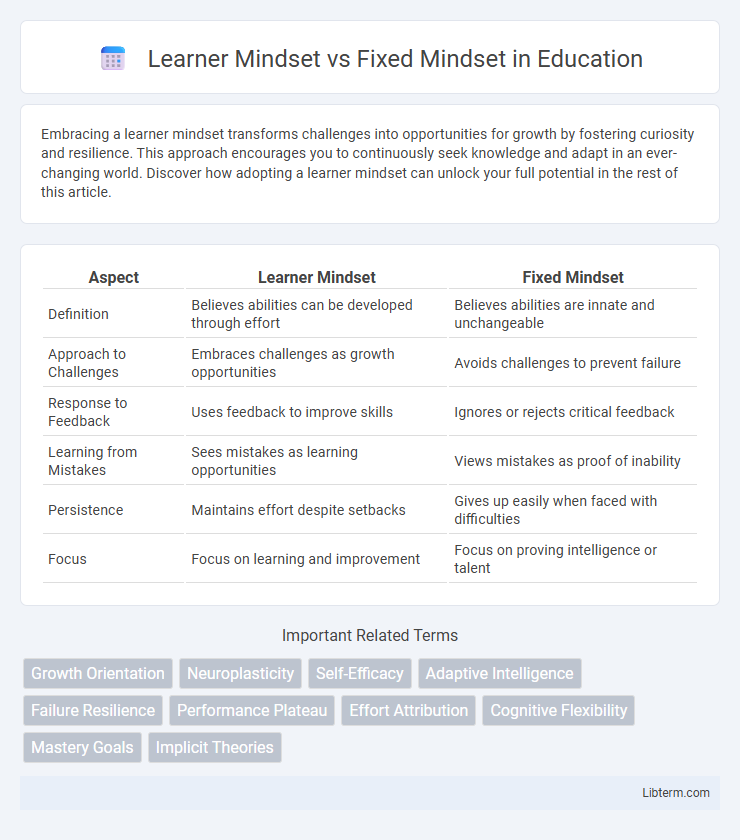Embracing a learner mindset transforms challenges into opportunities for growth by fostering curiosity and resilience. This approach encourages you to continuously seek knowledge and adapt in an ever-changing world. Discover how adopting a learner mindset can unlock your full potential in the rest of this article.
Table of Comparison
| Aspect | Learner Mindset | Fixed Mindset |
|---|---|---|
| Definition | Believes abilities can be developed through effort | Believes abilities are innate and unchangeable |
| Approach to Challenges | Embraces challenges as growth opportunities | Avoids challenges to prevent failure |
| Response to Feedback | Uses feedback to improve skills | Ignores or rejects critical feedback |
| Learning from Mistakes | Sees mistakes as learning opportunities | Views mistakes as proof of inability |
| Persistence | Maintains effort despite setbacks | Gives up easily when faced with difficulties |
| Focus | Focus on learning and improvement | Focus on proving intelligence or talent |
Understanding Learner Mindset and Fixed Mindset
Learner mindset embraces challenges and views failures as opportunities for growth, driven by the belief that abilities can be developed through effort and learning. Fixed mindset assumes intelligence and talents are innate and unchangeable, leading to avoidance of challenges and fear of failure. Understanding these mindsets is crucial for fostering resilience, motivation, and continuous self-improvement in personal and educational contexts.
Key Differences Between Learner and Fixed Mindsets
Learner mindset embraces challenges as opportunities for growth, emphasizing effort, learning, and resilience, while fixed mindset views abilities as innate and unchangeable, leading to avoidance of difficulties and fear of failure. Individuals with a learner mindset persist through setbacks, seeking feedback and valuing progress, whereas those with a fixed mindset often give up quickly and ignore constructive criticism. Key differences include adaptability, motivation, and response to failure, where learner mindset fosters continuous development and fixed mindset limits achievement potential.
Origin and Psychology Behind Mindsets
The origin of learner and fixed mindsets stems from Carol Dweck's psychological research on motivation and personality, highlighting how individuals perceive intelligence and abilities as either malleable or static. Neuroscientific studies show that a learner mindset promotes neural plasticity, encouraging growth through challenges, while a fixed mindset limits cognitive adaptation by fostering a fear of failure. These mindsets shape behavior, academic achievement, and resilience by influencing how people interpret effort, feedback, and setbacks.
Benefits of Adopting a Learner Mindset
Adopting a learner mindset promotes continuous growth by encouraging openness to feedback and resilience in the face of challenges. This mindset enhances problem-solving skills and adaptability, essential for personal and professional development. Embracing a learner mindset also leads to increased motivation and a deeper understanding of complex concepts, fostering long-term success.
Challenges of a Fixed Mindset in Personal Growth
A fixed mindset limits personal growth by causing individuals to avoid challenges, fearing failure or judgment. This mindset fosters a resistance to learning and adaptation, leading to stagnation and missed opportunities for self-improvement. Overcoming a fixed mindset is crucial for developing resilience and embracing lifelong learning.
How Mindsets Impact Academic and Career Success
A learner mindset drives continuous growth by embracing challenges, learning from mistakes, and persisting despite setbacks, leading to improved academic performance and greater career advancement opportunities. In contrast, a fixed mindset limits potential by avoiding challenges, fearing failure, and resisting feedback, which can result in stagnation and reduced achievement. Research shows individuals with a growth-oriented mindset are more likely to develop resilience, adapt to changing environments, and achieve long-term success in education and professional domains.
Recognizing Your Own Mindset Patterns
Identifying whether you have a learner mindset or a fixed mindset involves observing how you handle challenges and feedback. Those with a learner mindset embrace mistakes as opportunities for growth, while individuals with a fixed mindset often avoid difficulties and view abilities as static. Regular self-reflection and journaling can help recognize patterns in thinking, enabling a shift toward a growth-oriented approach.
Strategies to Cultivate a Learner Mindset
Embracing a learner mindset requires strategies such as setting specific growth goals, seeking feedback regularly, and viewing challenges as opportunities for development rather than threats. Techniques like reflective journaling and deliberate practice help reinforce adaptive thinking patterns, while cultivating curiosity through asking questions promotes continuous learning. Adopting these approaches enhances resilience and fosters long-term personal and professional growth by prioritizing effort over innate ability.
Overcoming Obstacles When Shifting Mindsets
Shifting from a fixed mindset to a learner mindset requires embracing challenges as opportunities for growth rather than threats to self-worth. Overcoming obstacles involves reframing failure as valuable feedback and persistently seeking new strategies for improvement. Developing resilience and adopting a growth-oriented perspective enhances problem-solving skills and fosters continuous personal development.
Long-Term Effects of Mindset on Life Satisfaction
A learner mindset, characterized by embracing challenges and viewing failures as growth opportunities, significantly enhances long-term life satisfaction by fostering resilience and continuous personal development. In contrast, a fixed mindset, which assumes abilities are static, often leads to stagnation and increased stress, negatively impacting overall well-being over time. Research from Stanford University highlights that individuals with a growth mindset experience greater fulfillment and adaptability in both professional and personal domains throughout their lives.
Learner Mindset Infographic

 libterm.com
libterm.com